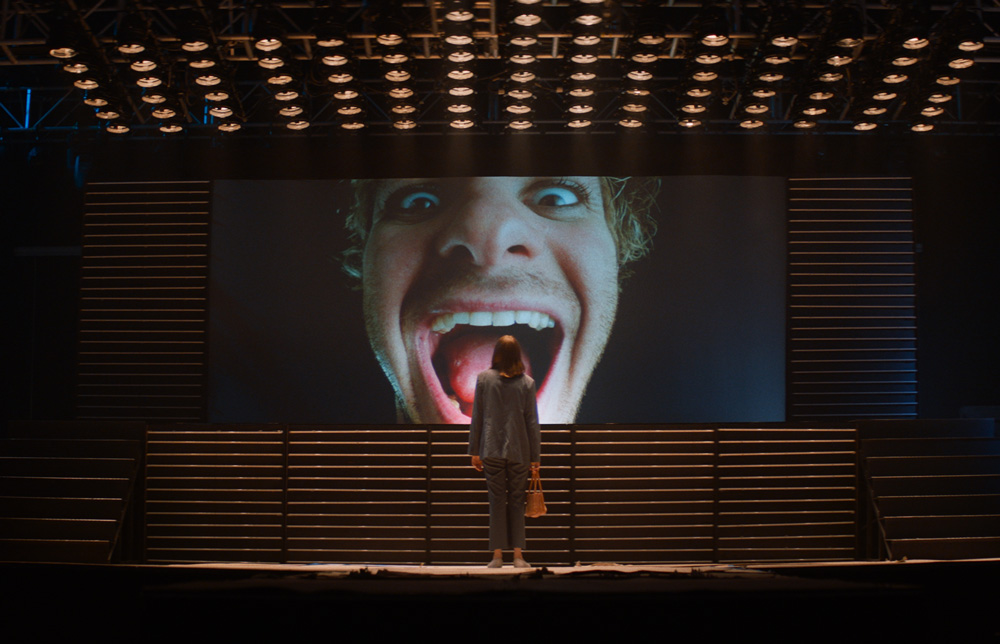After working under the radar to great acclaim with her debut feature “Palo Alto,” Gia Coppola was ready to go big with her follow-up “Mainstream,” which is how she ended up in a van parked on Hollywood Boulevard overseeing Andrew Garfield, wearing nothing more than a prosthetic over his private parts, running out onto Hollywood Boulevard in broad daylight.
“It was the best day ever,” recalls Coppola, who may have even had him do more than one take. “I was smiling ear to ear. I was so excited, and I was so proud that he did that, and it was totally real. I love a prank, and that was a real one.”
The scene is bound to grab the most attention from “Mainstream,” but Coppola keeps interest high throughout as she interrogates what it means to stay relevant in the internet age. With co-writer Tom Stuart, she has fashioned an inspired take on the promise of a wired world that has been increasingly bent towards the most crass and cynical ends, watching as Frankie (Maya Hawke), a bartender by night and aspiring filmmaker by day, becomes quickly infatuated by Link (Garfield), whose fearless public displays may draw few audiences in person except for security guards or police, but gains a following online when caught on her camera and uploaded to YouTube. Interest in making Link a bigger star follows and while chasing popularity is bound to be corrosive, he is giving the audience what they want, though what they could’ve had is something only Frankie knows and becomes increasingly disenchanted with.
Although Coppola had the kernel for the film after catching “A Face in the Crowd” on TCM, intrigued with someone having their talent revealed to them as a new medium takes shape, “Mainstream” is more than than an update, not only considering the public’s appetite to be entertained above all else, but how the invitation of the internet to interact has given an illusory embrace to those who look to it for affirmation, leaving out all but the few most outrageous who can provoke a response while anything else is white noise. Framed as a relationship taking the physical shape of a romance between Frankie and Link that starts to go sour, Coppola is able to get her arms around the intense connections that we can make online and the disenchantment that follows when they only extend so far in reality. Following its premiere at last fall’s Venice Film Festival where the film’s American cast and crew got a rare dispensation from COVID-related travel restrictions to attend, the exuberant satire is now making its way to American shores and Coppola spoke about being audacious in her sophomore feature, throwing real life YouTube stars such as Jake Paul and Patrick Starr into the mix and how being a prankster has served her well as a director.
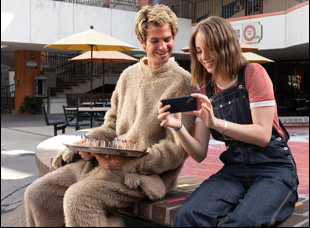
After “Palo Alto,” it was such a dreamy, more languid tone that I felt compelled to want to do something very the opposite and do something loud and colorful and bombastic. To me, anything that challenges me or feels like a new experience is where I gravitate towards. What was really fascinating to me is that storytelling is shifting into this new platform and technology, so how are we creative in this new space? How can you make it cinematic in a space that feels very un-cinematic? And I liked that challenge, to try to figure out is that something I could do.
Was the idea of moving through time what inspired you to start the film at the 1920s-esque speakeasy where Maya Hawke’s character Frankie works at first?
I live above Hollywood Boulevard, so there’s a lot of eccentricities over here and there are those kinds of bars. And there’s The Magic Castle, and I wanted to embody that. But also, the baby act [that Frankie is pulled onstage to be a part of] was something that actually happened to me and was very traumatic, and I needed to put that in there.
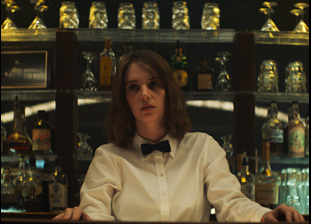
Yes, it was great to work with Andrew on that character. I feel like that’s when it really came alive because I knew I wanted a character that had that kind of personality and that trajectory, but how do you take a modernized version of that and convey it emotionally? [Andrew] was very good at being metaphoric to what this tone of the internet is and how it puts a haze over your eyes. But he’s extremely skilled and intelligent, so it was wonderful to have him as a guide and a collaborator in this kind of space. He brought so much to it.
[In general] I love working with the actors. I feel like they are the most essential part to filmmaking, and it’s very important to listen to them because they know their characters very inside and out. You start with a blueprint of what you hope to achieve, and there’s all these different layers of when the actor comes into play and they add their take on it and then the daily dynamics that you face on a movie set takes a part in that. Then the edit takes a part in it and the film just really tells you what it wants to be and who those characters are. What’s so fun about making movies is that there’s this magic that you can’t fully expect yet.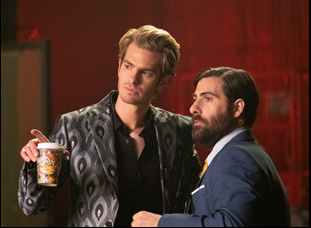
Yeah, I feel like so much of what the internet content is about is being exciting, unhinged and prankster-esque, so I wanted to make sure that when we do that it feels real, but for me, directing is a little bit about being a prankster. In order to get authentic moments, you have to steer people a certain direction, and they don’t know what what’s going to happen. Even for me, to be in a situation where I don’t know what’s going to happen is very exciting, and I think only is for the betterment of the film.
What was like bringing the influencers to set? Was there a different energy?
No, I think they’re very comfortable in front of the camera, so it didn’t feel anything unusual and they were all very lovely people. Because they were playing a version of themselves, I think they didn’t have to do too much character work, but I did find it fascinating that to them, what they do is a form of acting, but it is also very genuine to them and they have a deep connection with their audience, so they’re not trying to create some form of illusion. I don’t think.
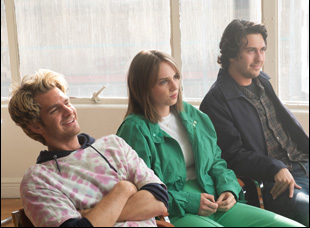
Yeah, at one point it was hard to figure out how do you make this much more insular, but I knew that I always wanted it to just be this love story triangle and have those kinds of emotional arcs, so if I could come from that place, that’s what’s going to make it actually engaging. There’s all the flashiness, but really you want the journey of the heart and to be able to relate to that. It also felt like a very standard dynamic that a lot of people go through when you maybe put a lot of yourself into a person that doesn’t love themselves or can’t love you back in that kind of way. Maybe the internet is like that. You love it, but it really doesn’t love you back.
What was it like getting out of the house and going to Venice with this?
It was very, very special. I was so grateful that I got to do that and very excited to feel like cinema is still there and being preserved. It was really, really cool that the Venice Film Festival was making such an effort to do that during this time and to share the film. For people to come see the film during that time was extra meaningful that they made that effort, so it was something I’ll never forget.
“Mainstream” opens in select theaters and on demand on May 7th.




